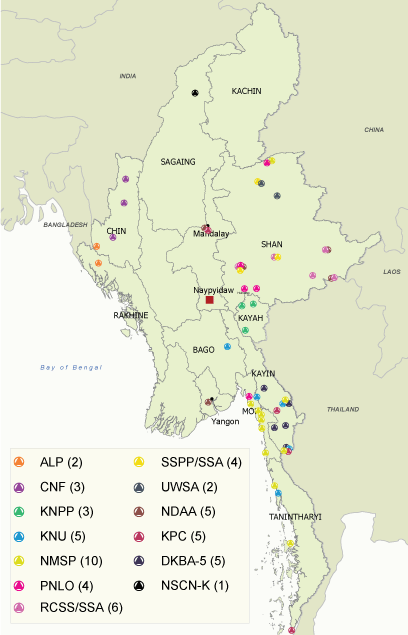The information below shows the progress made for the government’s ceasefire guidelines for the state and union level peace. In addition to the government’s guidelines, the ethnic armed groups have also raised other issues such as amnesty, resettlement support and rights protection. These can be found in the comprehensive chart of agreed and demanded points made within and outside the peace talks.
S1-3 Ceasefires
All major active ethnic armed groups have signed ceasefires with the exception of the KIA and allies AA, ABSDF and TNLA.
| # | Militia Group | Govt. Rep | Date | State |
|---|---|---|---|---|
| 1 2 3 4 5 6 7 8 9 10 11 12 13 14 |
UWSA/P NDAA-ESS DKBA-5 RCSS / SSA CNF KNU SSPP / SSA NMSP KNU/KNLA (Peace Council) KNPP ALP/ALA = RSLP NSCN-K PNLO ABSDF |
Aung Thaung Aung Thaung Aung Thaung Aung Min Aung Min Aung Min Aung Thaung Aung Min Aung Thaung Aung Min Col. Htein Lin* Col. Kyi Niang# Aung Min Aung Min |
06/09/2011 07/09/2011 03/11/2011 02/12/2011 06/01/2012 12/01/2012 28/01/2012 01/02/2012 07/02/2012 07/03/2012 05/04/2012 09/04/2012 25/08/2012 10/08/2013 |
Peace Process Stage 2 Peace Process Stage 2 Peace Process Stage 2 Peace Process Stage 2 Peace Process Stage 2 Peace Process Stage 2 Peace Process Stage 2 Peace Process Stage 2 Peace Process Stage 1 Peace Process Stage 2 Peace Process Stage 1 Peace Process Stage 1 Peace Process Stage 1 Peace Process Stage 2 |
| X X X X X X |
AA KIA TNLA LDU WNO ZRO |
combatant combatant combatant non-combatant non-combatant non-combatant |
*Rakhine State Minister of Border Affairs
# Ministry of Border Affairs
S4 Liaison offices
Manage all communication between government and ethnic armed groups.

S5 Official delegation
form an official delegation team and negotiate the place and time for Union Level negotiation.
Formed (6 groups): CNF, KNU, KPC, NMSP, PNLO, RCSS/SSA
Pending (7 groups): UWSA, NDAA, SSPP/SSA, ALP, NSCN-K, DKBA-5 and KNPP
U1-2 Non-Disintegration
All ceasefire groups accept the first two Union level points: Forever remain in the Union, Accept the Three National Causes: non-disintegration of the Union, non-disintegration of national sovereignty and perpetuation of national sovereignty
U3 Economic developments
All ceasefire groups agree to cooperate on economic developments. Several parties have made considerable headway in establishing economic and development partnerships with the government. However the KNU and NMSP have made few demands from the government so far.
| CNF | Agreed: to set up a Special Economic Zone, establish an organizing committee to seek funding, allow tourists to freely travel in and out of Chin state, promote IT skills, develop a national highway, construct at least one airport. |
| DKBA-5 | Development commitment. |
| KNPP | Cooperate with INGOs and NGOs on development issues, in communication with the Kayah state government. demanding: electricity in the whole of Kayah state. outside the ceasefire agreement: Set up two companies are Kayah Land company and Tamaw Htar company. |
| KPC | Demanding: border trade, regional infrastructure, exploration, trading (timber), tourism and mineral extraction. |
| NDAA | Agreed: INGOs can assist with development, commitment to develop tourism, education and health. cooperate to improve transportation mining and electricity. Demanding: access to mining, coal, gold exploration and production, allow outside investors, researchers to assess natural resources, allow trading of 10,000 tons of teak wood and 10,000 tons of other hardwoods, control of border checkpoints and taxation, supply rice, fuel oil and money. |
| NMSP | Work for the stability and development of education, health and social sectors. |
| PNLO | Coordinate with the government on agricultural projects. |
| RCSS/SSA | Agreed to set up a special industrial zone run by the RCSS/SSA outside the ceasefire agreement: created the Shan Taungdan Cherry company. |
U4 Drug elimination
The following 7 groups have agreed to cooperate on the government’s plan to curb narcotics in accordance with the Government’s Order No. 17/2011:
CNF, DKBA-5, KNPP, NDAA, PNLO, SSPP/SSA, RCSS/SSA
In particular, RCSS/SSA signed a tripartite agreement between the government and UNODC to combat drug production and trade in the region. The RCSS anti-narcotics division also has an official website that covers their activities and programs. http://www.rcssantinarcotic.org/rcssanc.org/
U5-7 Political party formation and accept 2008 constitution
All post-elections ceasefire groups refuse to accept the 2008 constitution and have not set up political parties for upcoming elections.
During the 2010 elections, KIO’s former Vice-president No. 2 Dr. Manam Tu Ja set up a political party called the Kachin State Progressive Party (KSPP), which included the NDA-K and Myitkyina-based Kachin Nationals Consultative Assembly (KNCA) – an umbrella organization for all the national Kachin politicians. However the election commission rejected their registration due to their close connections with the KIO. 14 KSPP leading members, including Dr. Tu Ja, tried to run as individuals but were rejected again by the election commission.
U8 Border Guard Force and People’s Militia Group
To coordinate existence of only a single armed forces in accord with the Constitution
The government’s order to all ethnic armed groups to transform into BGF and PMF is the biggest obstacle facing the peace process. All post-election ceasefire groups have rejected the order that would require them to fall under the control of the Myanmar military.
The UNFC proposed creating a Federal Union Army (FUA) that was formed in December 2011 and is led by Gen. Bee Htoo (KNPP).
